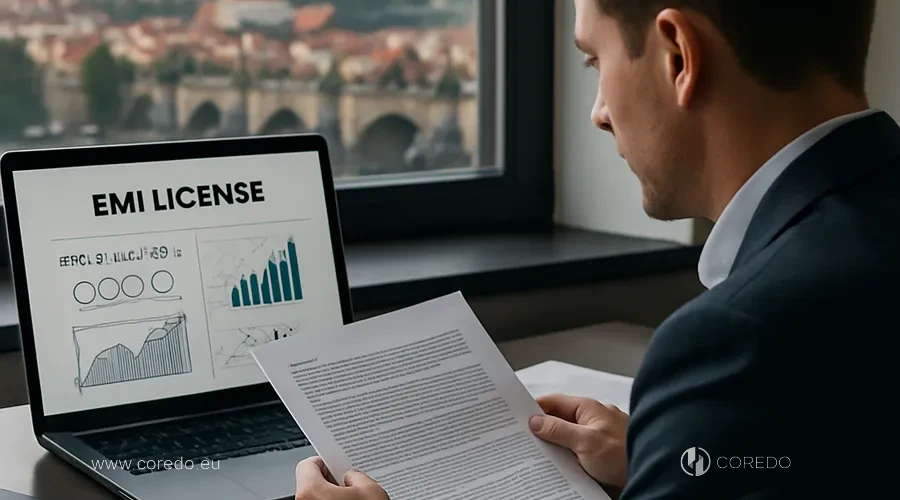In 2024 the electronic money market in Europe exceeded €400 billion, and the number of new EMI companies registered in the Czech Republic grew by 30% year‑on‑year. Why is the Czech Republic becoming a magnet for FinTech entrepreneurs? Against a backdrop of tightening regulation and increasing transparency requirements, the choice of jurisdiction for launching an EMI company determines not only time‑to‑market but also the long‑term resilience of the business. Facing bureaucratic hurdles, AML/KYC challenges and the need to integrate with European payment systems, many entrepreneurs ask: is it possible to open an EMI company in the Czech Republic quickly, transparently and with minimal risk?
In this article I share a practical guide based on COREDO‘s experience in registering EMI companies, obtaining licenses and supporting FinTech projects in the Czech Republic, the EU and Asia. By reading the article in full, you will gain not only strategic ideas but also concrete tools for successfully launching and scaling an EMI business in Europe.
Main requirements for opening an EMI company in the Czech Republic

The Czech National Bank (CNB) imposes strict but transparent requirements on applicants for an EMI license, in line with EU standards. Key parameters:
- Minimum share capital, €350,000. Funds must be held in an account at a Czech bank and documented. In COREDO’s practice this stage requires special attention: the CNB carefully verifies the sources of the capital and its legality.
- registration of a legal entity, the optimal form is s.r.o. (limited liability company). This format provides management flexibility and compliance with CNB requirements.
- Office and staff: the presence of a physical office in the Czech Republic and qualified personnel, including managers with experience in the financial sector. The solution developed by COREDO for foreign clients includes recruiting local specialists and organizing office infrastructure.
- Management qualifications – the CNB requires that directors and key managers have relevant experience and an impeccable business reputation. COREDO’s practice confirms: successful completion of the compliance check depends on the transparency of biographical data and the availability of references from the financial sector.
Registration of a legal entity and opening an office

Registration of a legal entity and opening an office is the first step toward legally conducting business and establishing the company’s official presence. This section provides a step-by-step guide that will help you understand the main stages of company registration (s.r.o.) and the necessary formalities to start full-scale operations.
Step-by-step company registration (s.r.o.)
The COREDO team has completed dozens of s.r.o. registration projects for EMI companies. The process includes:
- Preparation of founding documents, selection of a unique company name, and agreement on the structure of shareholders and directors.
- For foreign founders, legalization of documents and proof of residence are particularly important. COREDO’s solution allows all steps to be completed remotely using electronic signatures and online services.
- A registered legal address and a physical office are mandatory requirements of the CNB. The company must be able to receive correspondence and carry out operational activities in the Czech Republic.
- opening a bank account: one of the most challenging stages for non-residents. Our experience at COREDO has shown that preparing a complete set of documents and a business plan in advance significantly speeds up the bank’s compliance review process.
Obtaining an EMI license in the Czech Republic

obtaining a license for electronic money: a multi-stage process requiring strategic planning and a deep understanding of CNB requirements.
- Application stages: document preparation, drafting a business plan, collecting criminal record certificates and financial statements, and preparing AML/KYC policies.
- List of documents: passport details of founders and management, proof of source of funds, a business plan with a 3-year financial forecast, internal AML/KYC procedures, description of technical infrastructure.
- Licensing timelines: on average 3–6 months, including company registration, document preparation and CNB application review. The COREDO team supports clients at every stage, minimizing the risk of delays.
- Process cost: consists of the CNB state fee, costs for legal support, business plan preparation and office setup.
- Importance of the business plan: the CNB requires a detailed business plan reflecting development strategy, financial modelling, revenue and expense forecasts, as well as a description of risk management mechanisms and protection of client funds.
- AML/KYC procedures: without clearly defined internal policies for anti-money laundering and customer identification it is impossible to obtain an EMI license. COREDO’s solution includes developing tailored AML/KYC procedures taking into account EU and CNB requirements.
Documentation and business plan requirements
- Documents: passport details, criminal record certificates, financial statements, resumes of executives, proof of source of funds, corporate documents, AML/KYC policies.
- Structure of the business plan: description of services, target audience, competitive analysis, a 3-year financial forecast, risk management strategies, technical infrastructure plan, measures to protect data and client funds.
- Preparation specifics: the CNB pays special attention to the detailing of financial models and the transparency of funding sources. In COREDO’s practice, successful cases are built on integrating international reporting and compliance standards.
- The role of IT and data security: the documentation must describe the IT system architecture, measures to ensure data security, plans to protect against cyber threats and compliance with GDPR requirements.
AML/KYC and risk management in EMI

An effective AML/KYC system is a key success factor for licensing and the subsequent operation of an EMI company.
- AML/KYC requirements: the CNB requires the implementation of customer identification procedures, transaction monitoring, and automated systems for detecting suspicious operations. COREDO’s practice confirms that integrating modern RegTech solutions reduces operational risks and increases transparency.
- Monitoring and prevention of financial crime: regular checks, automated transaction analysis, and maintaining registers of suspicious transactions.
- Internal control and audit: development of compliance policies, conducting internal audits, and staff training. The solution developed at COREDO includes establishing an independent compliance function and implementing internal control systems.
- Protection of client funds: use of segregated accounts, a clear policy on safeguarding client funds, and regular reporting to the CNB.
Implementation of IT security and infrastructure
- Technical requirements: the EMI company’s platform must ensure reliability, scalability, and compliance with security standards. COREDO has implemented projects for integrating cloud solutions, building resilient architectures, and introducing FinTech innovations.
- Integration of payment services: connection to international payment systems, API integration, and support for multi-currency operations.
- data security: use of cryptographic protection methods, GDPR compliance, and adherence to the CNB’s information security requirements.
- The role of IT infrastructure: the company’s technical readiness directly affects the success of licensing and further operation. In COREDO’s practice, implementing comprehensive IT solutions enables rapid business scaling and integration with European payment systems.
Legal support for an EMI company in the Czech Republic

- Legal support: at every stage of licensing and running a business, support from experienced lawyers familiar with CNB requirements and European standards is necessary. COREDO’s solution provides comprehensive support: from registration to daily compliance.
- Tax regime: the corporate tax in the Czech Republic is 19%. EMI companies are subject to special rules for recording income and expenses, as well as reporting and capital control requirements.
- Liability and CNB sanctions: for non-compliance with AML requirements, client fund protection or reporting, the CNB may suspend a license, impose fines or initiate an investigation. COREDO’s practice shows that timely implementation of internal control procedures minimizes legal risks.
- Legal risks: the main threats are errors in documentation, non-compliance with compliance requirements, and insufficient transparency of capital sources. The COREDO team regularly audits documents and processes to ensure compliance with international standards.
Scaling and international development of an EMI company
- Single European Passport: obtaining an EMI license in the Czech Republic opens access to the entire EU market without the need for re-licensing in other countries. This is a strategic advantage for scaling the business.
- Expansion into Asian and African markets: COREDO’s practice includes cases of integrating Czech EMI companies with payment systems in Singapore, Dubai and the United Kingdom. Strategic planning allows taking into account the specifics of local regulation and IT infrastructure requirements.
- Financial modeling and forecasting: successful growth requires accurate calculations of profitability, revenue and expense forecasts, and assessment of investment payback periods. COREDO’s solution includes the development of financial models that take into account the specifics of the European and Asian markets.
- Business profitability: according to COREDO, the average payback period for an EMI company in the Czech Republic is 2–3 years with proper risk management and effective marketing.
Practical recommendations and conclusions
- Checklist for opening an EMI company:
- Prepare a detailed business plan and financial forecast.
- Assemble a complete set of documents for the CNB, including AML/KYC policies.
- Ensure the authorized capital is available in an account at a Czech bank.
- Set up an office and hire qualified staff.
- Implement IT infrastructure that meets security requirements.
- Undergo compliance checks and internal audit.
- Main mistakes and risks:
- Insufficient detail in the business plan.
- Errors in documentation and non-compliance with CNB requirements.
- Weak AML/KYC and internal control systems.
- Insufficient technical readiness of the platform.
- tips for choosing partners and consultants:
- Choose teams with experience in implementing EMI and FinTech projects.
- Check for successful case studies and references.
- Ensure transparency of processes and availability of comprehensive support.
- Final recommendations:
- Strategic planning, professional legal and financial support, and implementation of modern IT solutions: the key factors for successful licensing and long-term development of an EMI company in the Czech Republic.
Key requirements and timelines for obtaining an EMI license in the Czech Republic
| Requirement | Description | Timelines and specifics |
|---|---|---|
| Minimum share capital | €350,000, must be in an account in the Czech Republic | Average preparation time – 1-2 months |
| Legal entity registration | Limited liability company (s.r.o.) | 1-2 months |
| Office and staff | Physical office, qualified specialists | Mandatory requirement |
| Documents | Passport data, certificates, business plan, AML | Full package for the CNB |
| Application review process | Review by the CNB | About 1 month |
| Overall time to obtain the license | Preparation + review | 3-6 months |